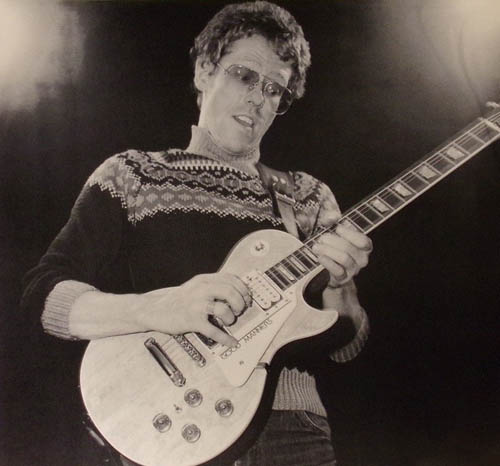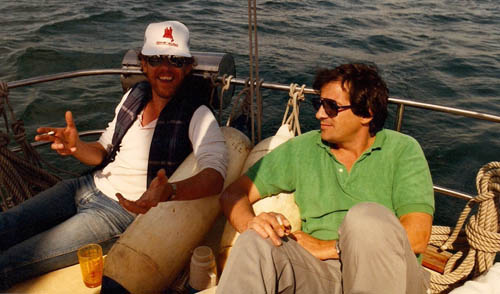
An interview with Graham Shaw
by Ian Hoey
Canadian Graham Shaw began his career by performing in a few local bands from his hometown of Winnipeg, Manitoba. Most notable of these was The Deverons, which included Burton Cummings before he went on to success with The Guess Who. Shaw’s big break came with a band he formed in 1977, The Sincere Serenaders, who earned a degree of fame in 1980 through a couple of hit singles – Can I Come Near and French Lady. When their second album, Good Manners In The 1980s, was less well received, Shaw went off to do his own thing and, of special interest to Alice Cooper fans, found himself collaborating on the Dada album, with co-writing credits on Enough’s Enough, Dyslexia and I Love America.
I caught up with Graham for some all-too-brief words about his participation on the record.
Q: Were you an Alice Cooper fan before you got involved with this album?
A: I saw him once live, on the Dead Babies tour in Winnipeg. While I thought the band was good, theatre rock is not really my first love. Oh dear! But a fact is a fact.
Q: How were you approached to contribute? Were there specific attributes you had that Alice or his colleagues were looking for you to bring to the production?
A: I had a minor flash of fame, having had a couple of pretty solid hits in Canada. Got to meet Bob [Ezrin] through those circles. We hit it off pretty well and he seemed to like my writing. He had me work on a stillborn Jeff Beck project over in England. So I went over to his place just to shoot the shit one day and he said, “Wanna work on the Alice thing?” Why sure! I just took some bits and pieces I had….crafted some new ones and he and I just kinda brainstormed and then….enter the Fairlight sampler! Ez was like a kid with a new toy.
Q: The tone, sound and recording process for this record was a radical departure from the previous albums, was this always intended to be the formula for it, or was it a style that developed as the songs came together?
A: We started building tracks with that appliance…drums, bass, synth. I was using the Fairlight plus my Oberheim OB-Xa as principals, plus hacking out some guitar parts etc. Enter Alice and Dick Wagner. We started to stack real guitar tracks and vocals plus introducing some more of their songs into the line-up, overdubbing real drums, pianos etc. Dick and I did background vocals, Alice scratch and final vocals, then it was just continuing to pound each piece into shape.
Q: The first song you're credited on, Enough's Enough, has a key position on the album as it bursts alive immediately after the mood-setting opener. Was it intentionally written for this pivotal role?
A: Not really. I wrote the first eight bars and left it at Bob’s. Next day he had the next four, for which he was almost apologetic, perhaps as a professional courtesy but which I quite liked. I agree though, the juxtaposition of Dada and Enough’s Enough is pretty snappy.
Q: Speculation has been rife for years as to what the concept of the album is. Was there an overlying theme there at the beginning or did it develop as time went on?
A: A very loose concept…pretty hard to call a dedicated concept. As I understood it, there was a certain irony attached to this particular zeitgeist as it was a final, contractually owed album for Warner Bros, which explains small ironies like Formerly Warner [Former Lee Warmer]. Hence there was no real hard set sequencing done in terms of tone or theme until the songs had actually evolved to the point of revealing themselves.
Q: For years I've theorised that Dyslexia was an intentional play on the anagram of daily sex. You know, ‘is this love or is this daily sex?’ Is there any substance to this idea or did I jump to the wrong conclusion?
A: Sorry to disappoint but the genesis of the title and topic was occasioned by Alice’s conviction that “Is dis love or is dyslexia” was a great play on words. As far as I’m concerned, it could easily have been “Lessdyxia.”
Interesting sidebar – on the original pressing, the line “Since I bumped into you I bump into walls” was sung by me ‘cause Alice couldn’t seem get the hang of it. Thank God that has since been rectified. It came on the radio a coupla of months ago so I turned it up. Hadn’t heard it in maybe 30 years, just cringing in anticipation of my weak-ass insert. Alice redid it and nailed it!
Q: The remaining song for which you are credited is I Love America. Not only a firm fan favourite but it also holds the honour of being the final Alice single released on Warner Bros. What are your memories of that?
A: We had a lotta fun doing I Love America. Even the operatic part and building the cavalry charge and retreat.
Q: It’s been an astonishing 37 years since the album was released. Have you crossed paths with Alice or Ezrin since?
A: Haven’t seen the lads in a long time.
Q: Thanks Graham. I know you released a solo album, Raw Shaw, in 2008. Anything else post Dada you’d like to mention?
A: After that I did a whole whack of national jingles, documentary television series and other television series. I’m currently working on a new album of songs. Got a lakefront property here with my babe and takin’ it easy.
And that was it for an all too short but entertaining chat with Graham Shaw. Having shared these tantalising details, I like to think he’ll reveal a bit more about the recording of Dada in the future. In the meantime, he’s clearly enjoying life.

Shaw and Ezrin at sea
(photo courtesy of Graham Shaw)